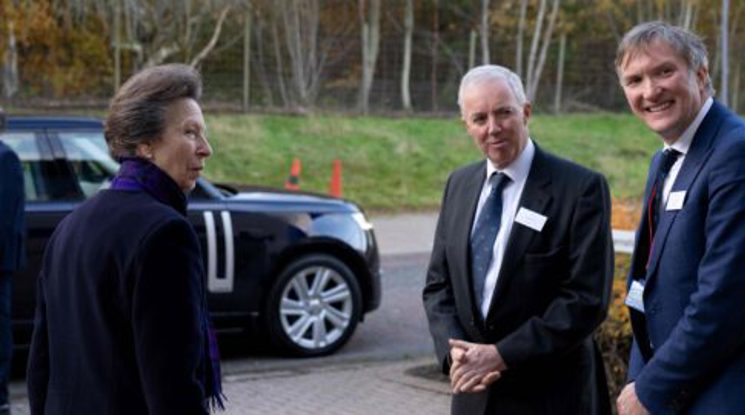The Princess Royal visits Moredun for new developments in livestock health contributing to sustainable agriculture
Her Royal Highness The Princess Royal attended a special event held at the Moredun Foundation, one of the largest livestock charities in the UK
Her Royal Highness The Princess Royal attended a special event held yesterday (Tuesday 31st October) at the Moredun Foundation, Pentlands Science Park to hear about the benefits of livestock health and well-being to sustainable agriculture.
Set up by farmers for farmers, the Moredun Foundation is one of the largest livestock charities in the UK and governs the work of the world renowned Moredun Research Institute. The mission of the organisation is to improve the health and welfare of livestock through research and education.
The Princess Royal attended the event as Patron of the Moredun Foundation and was joined by over 80 guests to hear more about Moredun’s work and those of its partners. Professor Steven Thomson, SRUC began by providing an overview of the economic impact of livestock diseases and the importance of livestock health and welfare for sustainable farm businesses. This was followed by Dr. Dan Price, Moredun Foundation Research Fellow who discussed the latest developments in creating new vaccines to help combat parasitic worms. Lastly, Professor Julie Fitzpatrick, Chief Scientific Adviser for Scotland and former CEO of Moredun Foundation reflected on the pivotal innovations across her distinguished career which have led to some of the most important solutions to tackle livestock disease.
During the visit, The Princess Royal met guests including a group of post-graduate students and early career scientists along with those representing the farming industry, science policy and the Equine Grass Sickness Fund.
Her Royal Highness also participated in a tour of Moredun’s laboratories to speak first-hand to the scientists about the latest research advances. Dr David Longbottom, Dr Holly Hill, Dr Sean Wattegedera and Dr Gaston Caspe showcased different approaches they are developing, funded by the European Commission and BBSRC, on new or improved vaccines and diagnostics against the bacterial pathogen Chlamydia abortus, which is responsible for Ovine Enzootic Abortion.
Dr Bill Golde and Dr Stephen Chiweshe highlighted their Scottish Government and BBSRC-funded research on developing next-generation vaccines for bovine respiratory disease complex. This disease is caused by multiple pathogens (viruses and bacteria) that are normally kept in check, but become pathogenic during times of stress in the animal.
Dr Fiona Kenyon and Dr Lynsey Melville exhibited a European Commission-funded project called “SM@RT” focusing on the potential of precision and digital tools in small ruminant farming; and a farmer-facing, free, online tool which helps with the interpretation of faecal egg count results for roundworms in sheep called ‘FEC Check’ funded by SEFARI Gateway.
Dr Tom McNeilly, Scientific Director of the Moredun Research Institute and CEO of the Moredun Foundation said, “Today's event at the Moredun Foundation showcased how the intersection of science and agriculture, championed by Her Royal Highness the Princess Royal, is not only vital for the health and well-being of livestock but also holds the key to a sustainable farming future. Moredun's dedication to improving livestock health, preventing diseases, and advancing farming practices demonstrates that innovation and collaboration are the cornerstones of progress in a rapidly changing agricultural landscape.”
Mr Gareth Baird, Chairman of the Moredun Foundation said, “We are delighted to welcome Her Royal Highness The Princess Royal to our event on improving livestock health, preventing diseases, and enhancing sustainability in farming practices. The farming sector is experiencing profound change with farmers being asked to address a host of challenges related to climate change mitigation, halting biodiversity loss and livestock health and disease. This event demonstrates that Moredun is a leader on the international stage and is continuing its long history of bringing scientists and farmers together to find innovative solutions to pressing issues.”
